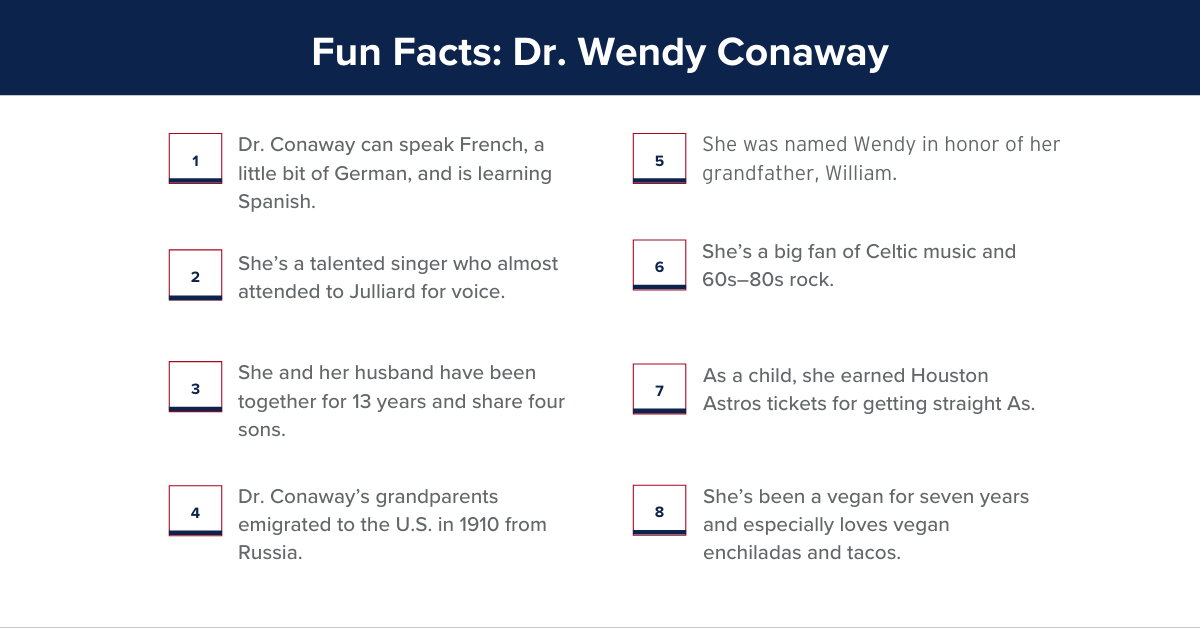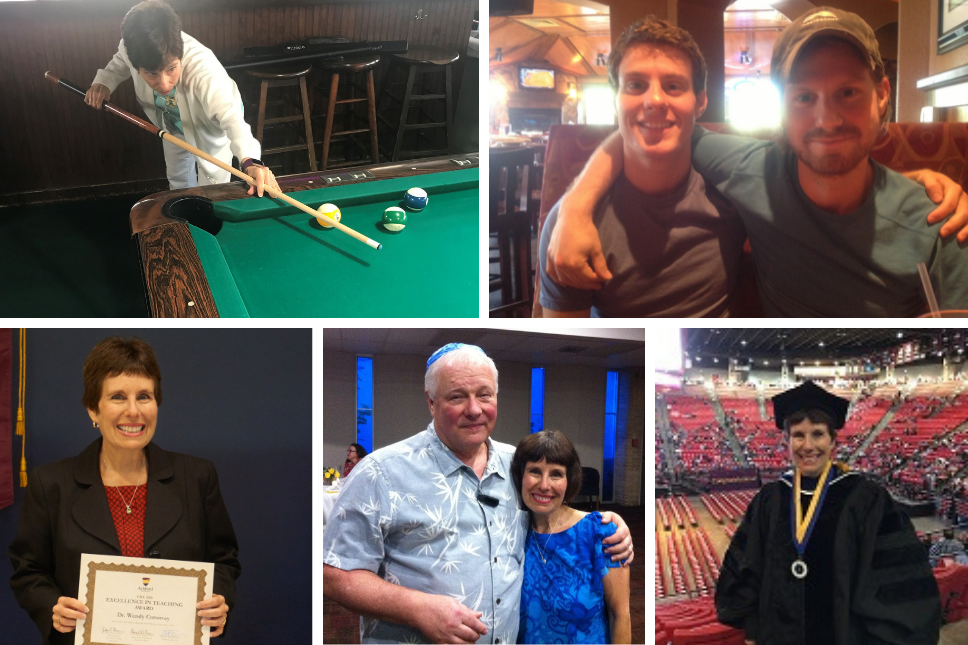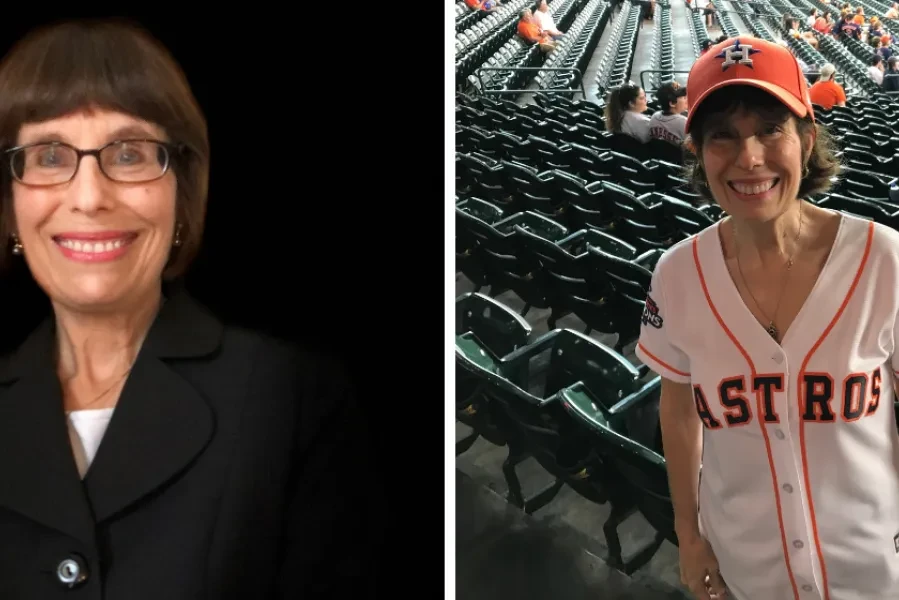Although she’s a Houston, Texas native, Dr. Wendy Conaway may greet you more naturally with a “bonjour” than a “howdy.” Graduating with a degree in French Studies in the late 70s gave her a deep love for both the language and the culture in France and opened her eyes to how there was much to explore in the world.
In fact, Dr. Conaway was only 19 years old when she spent a year studying abroad and traveling the continent of Europe by train. Completely on her own, too.
All in all, she’s visited 14 countries, but France is the one that will always hold a special place in her heart. After exploring Europe, she knew she wanted to play a part in helping make the magic of discovering new places possible for others.
“I fell in love with travel,” recalls Dr. Conaway, an assistant professor at the University of Arizona Global Campus (UAGC) and May 2021 Faculty of the Month honoree. So, she turned her passion into a career after graduating from college in 1979.
Dr. Conaway became a travel counselor with American Express and quickly moved up the corporate ladder, eventually earning one of the highest awards her global travel company bestowed on its employees. She happily established herself in the industry for the next two decades.
As a leader who managed a busy travel office, she was skilled at adapting to the unpredictable nature of her field. In early 2001, she returned to school for her master’s degree in human sciences in order to round out her leadership portfolio and better help with employee development and training.
Just a short time after returning to school, the terrorist attacks on September 11, 2001 happened. In an instant, Dr. Conaway saw the world change, and her entire industry was turned on its head.
As thousands of flights were abruptly cancelled and travelers were stranded far from home, she deftly jumped into action, leading her team as they helped book reservations and find alternative travel arrangements for their clients.
The experience challenged her leadership skills to the very core, testing her ability to lead through chaos, make reasoned decisions, and communicate effectively.
“Managing a travel office through 9/11 was an experience I don’t want to have to relive,” she recalls. “It was incredibly stressful and required every ounce of strength, patience, and leadership to maintain a calm and productive workplace.”
Being a veteran in the field, she had been sensing a shift in the industry since the mid-1990s, as airline commissions began to decline and then dissolve altogether. However, after 9/11, the travel industry barely survived. Dr. Conaway says she recognized the entire experience of traveling would never quite be the same.
Dr. Conaway knew she adored being a part of the action, but decided it was time to make a change and follow a new path in her life.

A Grand Career Leap
As the world continued to adjust to the new complexities caused by 9/11, Dr. Conaway worked in her position while finishing her MA in Human Science at Our Lady of the Lake University in Texas. Her thought was that she might use her new skills and knowledge to pursue a career in human resources.
However, once she graduated, she began teaching in the evenings at a Texas community college. Instantly, she knew it was the career path she was meant to take.
“That’s when I said, ‘This is fabulous! I love this,’” she recalls. “This is where I shine. Teaching makes my heart smile.” Sharing her passion for psychology and sociology with students fulfilled Dr. Conaway in a way she hadn’t experienced before.
She also began venturing into the new world of online education.
“I found it innovative as, clearly, it offered an opportunity for personal growth while delivering the same results in a different platform,” she explains.
Knowing that higher education was something she wanted to devote her life to, Dr. Conaway enrolled in school again. This time she would return to earn her PhD in Psychology so she could earnestly pursue becoming a full-time professor.
“I made a grand leap,” she admits. “I left the travel industry of over 20+ years. I trusted and had faith that I would find the dream job…and here I am,” says Dr. Conaway.
Dr. Conaway plays a key role in ensuring students’ success from their very first weeks in school through her work with the Academic Engagement Center (ACE). Her area of expertise neatly ties into her position at UAGC. She focused her doctoral work on the science and methods of adult learning, publishing a dissertation titled, “Andragogy: One Size Does Not Fit All” in 2009.
“This specialization — in combination with my own nontraditional educational background and corporate experience — puts me in a perfect position to support entry point students,” Dr. Conaway explains.
In her role at ACE, she’s dedicated to the very first course students take, called ASH 101 Launchpad: Developing Skills & Strategies for Success. This course helps adult learners assimilate into university life. Dr. Conaway also co-leads the ACE Professional Development efforts, producing and presenting monthly sessions that enhance faculty and associate faculty skills by focusing on topics that pertain to the world of online learning and higher education.
A Professor and a Pool Shark
When she’s not teaching, Dr. Conaway can be found taking her two dachshunds for walks around the neighborhood, perfecting her favorite vegan recipes, and playing pool.
As a child, she learned the game from her dad, who would take her to play while her mother was visiting her grandfather in a nursing home. The tradition turned into a way for her to destress during her downtime as an adult.
Today, it’s a favorite pastime for Dr. Conaway and her husband, who played regularly prior to the pandemic.
The coronavirus pandemic put a year-long pause on what was one of their favorite activities, but they recently played for the first time in more than a year.
“My husband and I have found a pool place in Houston that is non-smoking and plays rock and roll,” she says. “It was wonderful. Although we hadn’t played in quite a while, I still beat my husband six times,” she laughs.

Getting to Know Dr. Conaway
We talked more in-depth to Dr. Conaway to learn more about her work with the ACE and her efforts in helping ensure each UAGC student makes the most of their time in school.
UAGC: Can you give us an overview of the Academic Engagement Center and how that very first course (ASH 101) helps set students up for success during their time at UAGC and beyond?
Dr. Conaway: “The Academic Engagement Center is dedicated to the first-year experience. We set the foundations of general education and for our students so that they have a good groundwork to build for their professional programs.
As a professor, my dedication is to my students. The first thing I do each day is log in and check on my students. Whether it’s answering questions, providing them encouragement, whatever is needed; I make sure every student is attended to and nurtured so they can have the best possible experience. In this position, I recognize that our course – which is the first course that students take at UAGC – we are the face of the university.
How we respond to our students, how we nurture our students, and how we treat our students sets the tone for them and helps them become more at ease and confident in their choice of coming to UAGC.
The purpose of ASH101 is to help assimilate students into university life. We are there to help answer questions as they are getting started. Students tend to have a lot of questions at the beginning of their course, but not so much at the end. One of our main purposes is to help them be acclimated to the support resources they have within the university.
However, instead of simply answering their questions and telling them exactly what to do, we guide them to places where they can continue to find answers for themselves. We want students to be self-directing and autonomous as they’re going to need to be that way throughout their time in school.
The other thing we try to do is relate what they’re doing to their future careers as much as possible. We want them to discover their why, their purpose, and their passion. That’s what they’re going to need to sustain their growth for the next several years.”
UAGC: What type of evolution do you see in these new UAGC students from the start of their first course to when they complete it?
Dr. Conaway: “You definitely can see a change in our students. When they first arrive, they are nervous. They’re anxious. They lack self-confidence. They’re struggling with time management and desperately seeking help with learning how to incorporate their schooling with their jobs, their families, and all their other responsibilities.
The first few weeks, students struggle. Around the third week, they start to get their bearings. They’re getting more into the groove. By the end of the course, you can see that escalation in self-confidence. You can see that they’ve become a bit more polished, and they’re understanding deadlines a little bit better. They’re finding their cadence in managing their courses and their home life.”
UAGC: Do you have any specific advice you’d like to share with students that will help them achieve success?
Dr. Conaway: “I would suggest they maintain a growth mindset and cultivate grit. A growth mindset will help them become open to learning, accept feedback, and recognize that the effort they put in will be critical to their success. Cultivating grit will help them get through the tough times (and there will be some, for sure) and stay on-track toward their goals. Finally, they need to make sure they have a good support network to help keep them accountable and to help celebrate their success.
Other key things I’ve learned over the years are to treat everyone with respect. The importance of critical thinking. And you are never too old, too smart, or too busy to learn!”
UAGC: Can you talk about how you bring your many years of working in the travel industry into your classroom and share what’s shaped your approach to teaching and education?
Dr. Conaway: “Working in the travel industry was working in corporate America. I relate not only to what students who are currently a part of that are dealing with, but I can also help others learn from my experiences. I find myself in a unique position because I have not been in academia all my life.
I’ve not been insulated to what students may be experiencing when they get out there. For example, if students are apprehensive about receiving feedback, I help them understand that feedback is something they will encounter from bosses and managers. And how they approach that feedback will speak volumes to the ability to move up in their companies.
My philosophy is to teach my students the way I would like to be taught — with respect and with purpose. Having been a student in both online and face-to-face academic environments, I made mental notes of what did and did not work so that I could use it to inform my own approach. I also share my own experiences with my students so that they can be aware that I have “been there, done that” myself.
UAGC: Tell us about some of the other initiatives you’re involved with at UAGC?
Dr. Conaway: “In addition to my work with the Academic Engagement Center, I also co-lead the ACE Professional Development effort to produce and present monthly sessions. I also am currently heavily involved in the implementation of Toastmasters clubs at UAGC.
The Toastmasters is something I’m particularly proud of as it was an organization I first joined to help allay my own apprehensions about speaking in public, and to build more confidence while speaking in groups or as I made videos for my students.
Participating in it helped me immensely and I recognized the value that same process could have for both our students and our faculty.
The Toastmasters clubs will be something that’s not just unique to the Academic Engagement Center. It will be university wide and roll out to all of our students in June.
From a little bitty idea, it has now grown into something that will benefit our students so much. It will help prepare them for the workplace, develop self-confidence, and help develop leadership and speaking skills.
For any faculty or student wanting to take part in a UAGC Toastmasters club, we encourage them to visit toastmasters.uagc.club to learn more.
UAGC: You co-authored a book that ties in well with your expertise in the world of adult online learning. Can you tell us a little more about that book?
Dr. Conaway: The book is titled Online Instructor Sanity: Stories and Self-Reflection to Bring Joy to your Online World. It was geared toward professors and shares stories that online instructors can relate to.
--
Leah Nanaa is a frequent contributor to the Forward Thinking blog.
